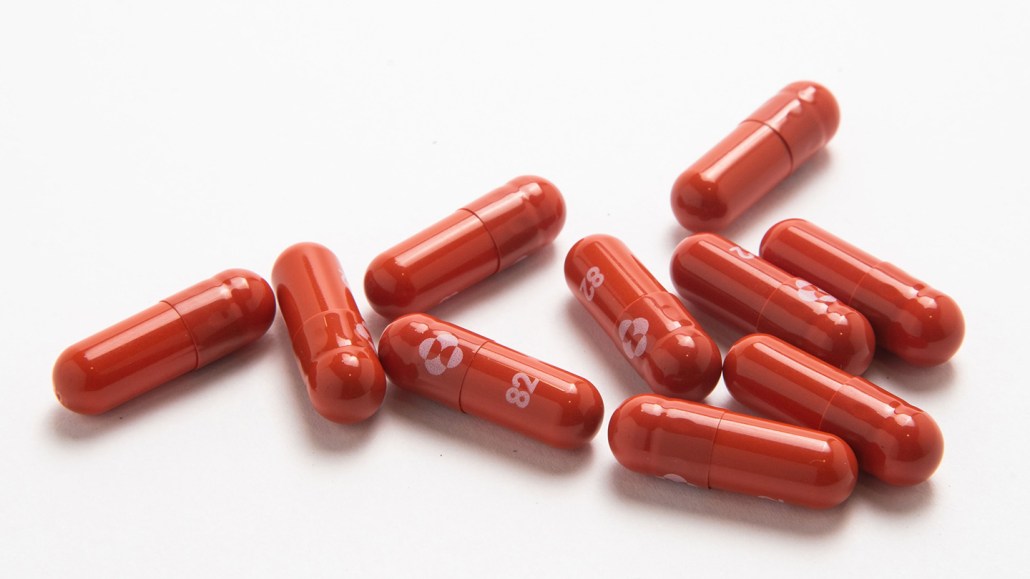A new antiviral pill cuts COVID-19 hospitalization and death rates
Efforts to find an easy, early COVID-19 treatment may have finally panned out

An antiviral pill (shown) made by Merck to treat COVID-19 may keep newly diagnosed people out of the hospital and prevent them from dying.
© 2009-2021 Merck Sharp & Dohme Corp., a subsidiary of Merck & Co., Inc., Kenilworth, N.J., U.S.A. All rights reserved
An at-home pill against coronavirus halves the chance that people newly diagnosed with COVID-19 will land in the hospital or die, early results released by the drug’s developer indicate.
The pill, an antiviral drug called molnupiravir, was tested against a placebo in people at high risk of developing severe disease. Of the 377 people who got the placebo, 14.1 percent, or 53, were hospitalized within 29 days of starting the trial, with eight dying. By comparison, 7.3 percent, or 28, of the 385 patients who got the drug were hospitalized in the same time period. None died, officials with the pharmaceutical company Merck announced October 1 in a news release. Similar numbers of people taking the drug and the placebo reported side effects, but fewer people in the drug group stopped treatment because of those side effects. The news release did not describe what those side effects were.
About 40 percent of participants in the interim trial were infected with the gamma, delta or mu variants of the coronavirus (SN: 7/30/21). Molnupiravir was as effective against those variants as it was against earlier versions of the virus, the company reported. Full results from the study aren’t yet available and other scientists have not reviewed the data.
Finding drugs that can work early in an infection hasn’t been easy (SN: 7/27/21). Currently, only some lab-made antibodies are authorized for newly diagnosed COVID-19 patients who are not sick enough to go to the hospital (SN: 9/22/20). Those antibodies must be given through an IV, making it difficult for some people to get treatment.
“Antiviral treatments that can be taken at home to keep people with COVID-19 out of the hospital are critically needed,” Wendy Holman, chief executive officer of Ridgeback Biotherapeutics said in the news release. Ridgeback and Merck have partnered to develop molnupiravir and will share profits.
The most exciting aspect of the drug is that it can be taken in pill form, rather than as an intravenous infusion like remdesivir, says Mark Denison, a virologist at Vanderbilt University Medical Center in Nashville (SN: 4/29/20). He did much of the early lab testing of molnupiravir, previously known as EIDD-2801 or MK-4482, but was not involved in the clinical trials (SN: 8/24/20).
In some of the children Denison treats as the director of pediatric infectious diseases at VUMC, remdesivir treatment comes too late. The same is true for many adults hospitalized with COVID-19. “At that point, why don’t you just pour the drug on their heads instead of giving it to them IV, because you’ve already moved past the window where it can be effective.” Delaying antiviral treatment is akin to waiting to give antibiotics until a wound is infected down to the bone, he says.
Giving antivirals early in an infection has a chance of stopping the virus before it can do much damage or prod the immune system to overreact. Molnupiravir could potentially be prescribed as soon a patient gets a positive COVID-19 test result, perhaps heading off floods of COVID-19 patients that are overwhelming medical systems as the highly transmissible delta variant circulates. In combination with vaccines, an effective early treatment might help get the pandemic under control.
Interim results from the molnupiravir study were so encouraging, an independent review panel decided to stop the global trial early. Merck said it plans to seek emergency use authorization for the drug from the U.S. Food and Drug Administration and will apply for authorization in other countries as well.
“To stop a trial for futility is pretty common, when a drug isn’t working or when it’s showing a negative effect,” Denison says. “But to stop a trial because of efficacy, because the drug is working so well is really unusual. He adds, “I’m amazed but not surprised” that the antiviral performed well in humans. In his experiments with cells grown in lab dishes and in animal tests, “I was blown away by its effectiveness against multiple coronaviruses.”
Like the FDA-approved antiviral remdesivir, molnupiravir mimics building blocks of the coronavirus’s genetic material, RNA. The fake building blocks interfere with the polymerase enzyme the coronavirus uses to copy its RNA. But the two drugs work differently. Remdesivir is a delayed stop sign, Denison says. When it is inserted into a growing strand of RNA, it slows the polymerase, eventually causing it to grind to a halt, much like a car entering an intersection as the traffic light turns yellow may stop in the middle of the intersection, he says. Molnupiravir instead pockmarks the RNA with many mutations, causing the breakdown of the polymerase and other viral components, much like a pothole-strewn road can cause a car to break down. Those mutation potholes don’t just stop the RNA-copying enzyme, they also cause damage to other proteins the virus needs to infect cells and replicate.
Sign up for our newsletter
We summarize the week's scientific breakthroughs every Thursday.
Viruses can develop resistance to some antivirals, like the anti-influenza drug osteltamavir, sold under the brand name Tamiflu. But with molnupiravir, “resistance mutations can’t emerge because the drug makes too many other damaging mutations,” Denison says.
Merck says it can make as many as 10 million doses of molnupiravir by the end of the year. The company has entered into agreements with generic drug makers in more than 100 low and middle-income countries to produce the drug as well.







